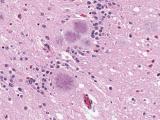May 3, 2005 (CIDRAP News) Academic researchers will join with a drug manufacturer in the United Kingdom to screen hundreds of thousands of compounds in a hunt for a treatment for variant Creutzfeldt-Jakob disease (vCJD), British officials announced recently.
The United Kingdom Medical Research Council's (MRC's) Prion Unit in London will work with GlaxoSmithKline (GSK), the country's largest drug manufacturer, the MRC announced in April. The Prion Unit is in the Institute of Neurology at University College London.
About 150 people in the UK have died of vCJD, the human form of bovine spongiform encephalopathy (BSE), or mad cow disease. There is no cure for the fatal brain-wasting disease, which people can contract by eating meat products from BSE-infected cattle. BSE spread through British cattle herds in the 1980s and 1990s, and it is assumed that many Britons were exposed to the disease before rigorous controls were imposed in 1996.
The MRC said the Prion Unit has been working for years to understand the propagation of prions, the misfolded proteins that cause vCJD in humans and BSE and scrapie in animals. The unit "has shown in prion-infected laboratory animals that the disease process in the brain can be halted by targeting this protein, without apparent deleterious effects," the MRC said. "The aim is now to develop a drug that is capable of readily entering the brain and binding to the normal prion protein" to keep it from misfolding and turning pathogenic.
To find such a drug, researchers will screen hundreds of thousands of potential drug-like molecules from GSK's collection, which contains more than a million such compounds and is one of the largest collections in the world, the MRC said. "Such libraries form one of the most important commercial assets of any pharmaceutical company and making such a library available to an academic group in this way is unprecedented," the agency stated.
Officials estimate it will take at least 6 years to find a potential treatment and develop it for use in human trials.
The incubation period for vCJD lasts a decade or longer, and no one knows how many people in Britain may be silently infected. The MRC said the long latency period offers an opportunity to develop an effective treatment, but because the disease is so rare, normal commercial drug development is unrealistic.
The partnership between the Prion Unit, University College London, and GSK "brings together for the first time all the relevant expertise and resources to make such a development feasible and may act as a stimulus to such academic-industry collaborations in other areas of medicine," the MRC said.
Professor John Collinge, director of the Prion Unit, said in the news release, "There is only so far we can take things on our own as academic scientists and, while there is no guarantee of success, now having the enormous resource and expertise of GSK with us is extremely exciting."
See also:
MRC news release
http://www.mrc.ac.uk/Newspublications/News/MRC002040


















